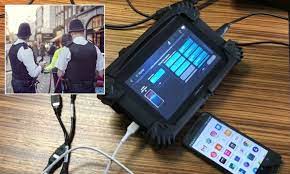Charges or an arrest are typically the first signs of a legal difficulty. There are times when legal issues arise far earlier. Although you won’t always be aware when law enforcement starts looking into you, knowing the resources at their disposal can help you safeguard your privacy. Can Police tap your Phone might no longer be a question.
Law enforcement has access to any activity that occurs in plain sight with little to no documentation or monitoring. The authorities can see what you do in public areas or just in front of a public area, such as via an open window in a house or business. The fact that cops can access completely private correspondence is less clear.
The Police can tap your phone and listen in on your chats as one of several methods they use to investigate crimes. Even though authorities must adhere to tight standards when conducting wiretaps, they seriously infringe on privacy and can yield compelling evidence against prospective offenders.
This article gives a general summary of the debate regarding the legality of phone taps by law enforcement.
The Wiretap Order
Before listening in on your phone calls, the Police must get a wiretap warrant. Like a warrant, to tap your phone lines to assist them in preventing a severe crime like drug trafficking, money laundering, or terrorism, the Police must demonstrate to a judge that they have reasonable grounds to believe that doing so will help them.
The Police are held to a more excellent standard when requesting wiretap orders than when requesting warrants, nevertheless, because wiretapping is such an intrusive practice.
Wiretapping Restrictions
Ordinarily, orders enabling telephone taps include privacy-related limitations, including time limits that prevent the Police from continuously listening.
Additionally, law enforcement must restrict eavesdropping to only those communications likely to include information against the suspect.
Additional Techniques on How Police Can Tap Your Phone
Additionally, without a wiretap order, law enforcement may tap your Phone via “tap and trace” or “pen registers.” These techniques just record the phone numbers connected to the line; they don’t capture real talk. Taps and traces keep track of the phone numbers that call a particular phone line. Pen registers keep track of the phone digits from incoming calls.
What Details May the Police Gather via a Wiretap?
With a court warrant, law enforcement may use Google or your mobile service provider to access your messages and emails. They do not need to demonstrate probable cause for this order as they would for a wiretap warrant. Let’s take a deeper look at the circumstances that lead to Police asking individuals for information:
Emails
Authorities must get a warrant to view unread emails from the previous 180 days. With a subpoena, the Police may collect your opened and unread texts 180 days or older. However, they must inform you after they have asked the supplier for this access.
If law enforcement obtains a court order, they can examine older, unread emails without notifying you. It is more challenging to get this order than a subpoena since they must demonstrate that the emails are pertinent to their inquiry.
Location
Under some circumstances, the authorities may be able to locate you using the data from your cell phone. Cell phone towers and GPS capabilities on smartphones may both deliver this data. Cell phone providers can share the location of a phone with the Police, and some companies demand a fee for doing so. Internet service providers can provide law enforcement with location information using the IP addresses of their users.
IP Addresses
As with your phone data, authorities may get a court order to view your IP addresses in real time. To achieve this, the documents must first have court approval pertinent to the Police’s criminal investigation. After receiving an administrative subpoena, law enforcement can also access historical IP address information.
Text Messages
To preserve, examine, and print texts from your iPhone backup, police agencies can utilize a variety of tools. Can law enforcement retrieve deleted text messages? To strengthen their case, they can retrieve some of the messages you’ve erased using apps, including Decipher TextMessage.
The cops may accomplish this by installing this application on their department computer and utilizing iTunes to back up any iPad or iPhone. They only need to choose a contact to export communications from and obtain them as a PDF file so they may save them for their investigating needs.
Checking if Police Tapped your Phone.
Listen for odd noises throughout your chats to determine whether someone is tapping your phone line. The cops may be listening in on your discussions if you notice strange background noises, such as high-pitched buzzing, static, or anything similar.
A heated battery is one of several other signs that someone could use your phone to access it remotely. Another warning indicator is if the smartphone starts up, turns on, or downloads programs at random.
If your Phone doesn’t charge, authorities may listen to your discussion. Not one of them, however, is a 100% guarantee that someone is listening to your discussions.
What Proof Must the Police Present Before They Can Tap Your Phone?
The Police must establish the necessary probable cause to get a search warrant to request a court order for a wiretap.
Once more, probable cause is the basis for the conviction of the targeted suspect in committing a crime. Again, to conduct an inquiry, police enforcement must demonstrate that all other less invasive options have been tried or that doing so would be too risky.
What Happens if the Police Ignore or Break a Warrant?
Unless one of the participants in a phone discussion assents to a wiretap, the Police cannot listen in on someone’s phone talks without a warrant. Any data they collect without a warrant and permission cannot be used in criminal prosecution as evidence against a person.
The same holds for data collected against the letter of a warrant. As the outcome of an unlawful search, the information may be concealed. Additionally, it can be considered police misconduct if the Police employ a wiretap without a court-issued warrant or in violation of one.
Does the Warrant Requirement for Wiretapping Have Any Exceptions?
In exceptional cases, the Police may get an emergency wiretap, which they will cooperate with the phone provider to put up the wiretap rapidly. After that, the prosecution has 48 hours to get a warrant.
Since a warrant is still necessary, there isn’t an “exception” in this case. Only a short time after the eavesdropping starts can it be obtained. Of course, the wiretapping would have to stop if the judge decided not to issue the warrant.
Do I Need an Attorney?
Regarding wiretaps, there are both federal and state laws. The wiretap laws vary from state to state. Furthermore, as is evident, the legislation governing wiretapping can be challenging. Consult a criminal defense attorney if law enforcement has tapped your Phone. You can find out if you have a case against law enforcement action with the aid of an expert attorney. You can learn more about your rights and defenses from your attorney.
Conclusion:
Can Police tap your Phone? There are instances where legal trouble begins long before an individual is arrested or accusations are made, although this is how we often conceive of legal issues. Understanding the resources accessible to law enforcement will help you safeguard your privacy, even if you won’t always be aware when they start to focus on you for inquiries.
Read also:



